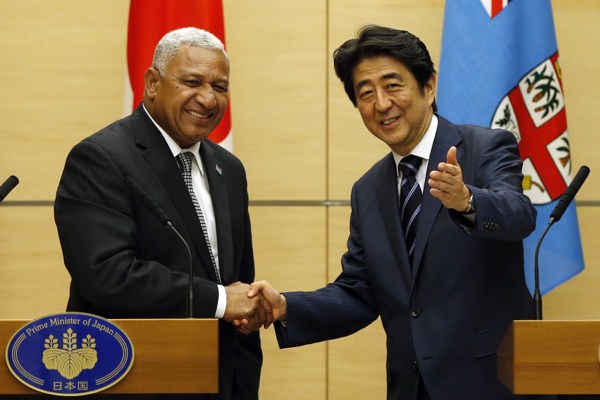Late last month, Japan hosted the 7th Pacific Islanders Leaders Meeting (PALM) in Fukushima prefecture. The PALM meeting represents the foundation of Japan’s engagement with states from the South Pacific, and has traditionally been a forum dominated by Tokyo’s provision of overseas development assistance to the region. But Japan’s relationship with many of those island states is deepening, as Tokyo looks to incorporate more political and security cooperation amid growing regional competition from China.
This year’s PALM meeting was attended by the Forum Island Countries (FIC)—Fiji, Kiribati, the Marshall Islands, Nauru, Niue, Palau, Papua New Guinea, Samoa, Solomon Islands, Tonga, Tuvalu, Cook Islands and the Federated States of Micronesia—as well as Australia and New Zealand (who with the FIC states make up the Pacific Islands Forum). At the summit, Japan pledged to devote $440 million in aid to the FIC states over the next three years, elevating Tokyo’s planned assistance to those states to nearly $1 billion from 2013 to 2019. Tokyo’s engagement with the FIC states is rooted in development, but ties have also evolved to focus considerably on environmental security and issues such as climate change and disaster risk management.
Japan has used these new initiatives as a way to leverage its soft power in the region. Japan announced that it would be contributing $1.5 billion toward the initial resource mobilization of the Green Climate Fund, part of the U.N. framework on climate change aimed at assisting developing countries mitigate climate change and adapt to its impacts. In March, Cyclone Pam wreaked havoc on several countries in the region and resulted in massive destruction in the tiny island of Vanuatu. Tokyo was among the first countries to announce an aid package—of $1.24 million—for Vanuatu and the other affected countries, including Tuvalu, Kiribati and the Solomon Islands. Japan also dispatched its rapid response medical team, a division of its Self-Defense Forces (SDF), to Vanuatu. The mission drew from Tokyo’s expertise in humanitarian assistance and disaster relief in the region, from providing tsunami-related information to the FIC countries to helping them improve their capacity for meteorological, seismic and tsunami observation.

